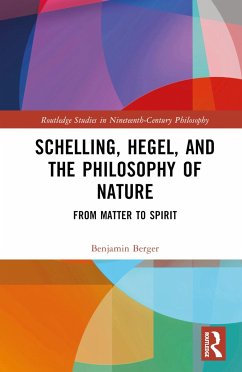This book develops an original interpretation of the relationship between F.W.J. Schelling and G.W.F. Hegel. It argues that the difference between these philosophers should be understood in light of their shared commitment to the philosophy of nature and the idea that spirit, or humanity, emerges from the natural world.
The author makes a case for the contemporary relevance of German idealist philosophy of nature by walking the reader through its major themes, motivations, and arguments. Along the way, Schelling and Hegel are shown to develop key insights about the structure of reality and the dependence of living things and human beings upon inorganic natural processes. In elucidating the details of Schelling's and Hegel's respective philosophies of nature, the book challenges some of our most basic assumptions about the scope of philosophical inquiry and the relationship between matter, life, and human existence.
Schelling, Hegel, and the Philosophy of Nature will appeal to scholars and advanced students working on German idealism, as well as those interested in contemporary philosophies of nature and the topic of emergence.
The author makes a case for the contemporary relevance of German idealist philosophy of nature by walking the reader through its major themes, motivations, and arguments. Along the way, Schelling and Hegel are shown to develop key insights about the structure of reality and the dependence of living things and human beings upon inorganic natural processes. In elucidating the details of Schelling's and Hegel's respective philosophies of nature, the book challenges some of our most basic assumptions about the scope of philosophical inquiry and the relationship between matter, life, and human existence.
Schelling, Hegel, and the Philosophy of Nature will appeal to scholars and advanced students working on German idealism, as well as those interested in contemporary philosophies of nature and the topic of emergence.
"Berger's lucid and provocative text demonstrates the critical importance of The Philosophy of Nature to the very coherence of Schelling and Hegel, indicating both their proximity and divergence. This is an important contribution to the emerging re-evaluation of the legacy of German Idealism."
Jason M. Wirth, Seattle University, USA
"Not only does this book do important work in clearly explicating key aspects of Schelling's philosophy of nature, it also invites us to remember how similar Hegel and Schelling really are - and it is therefore able to highlight fundamental aspects of their shared project that is so often occluded by the tendency to pit them against one another. A compelling work that is likely to become a central text in the field of German idealism."
Charlotte Alderwick, University of the West of England, UK
Jason M. Wirth, Seattle University, USA
"Not only does this book do important work in clearly explicating key aspects of Schelling's philosophy of nature, it also invites us to remember how similar Hegel and Schelling really are - and it is therefore able to highlight fundamental aspects of their shared project that is so often occluded by the tendency to pit them against one another. A compelling work that is likely to become a central text in the field of German idealism."
Charlotte Alderwick, University of the West of England, UK

